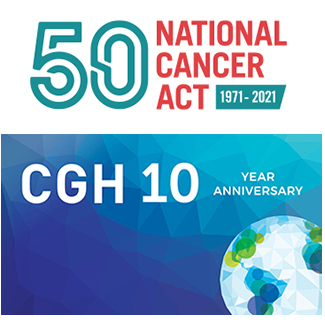NIH marks two major milestones in cancer research
November/ December 2021 | Volume 20 Number 6
 Credit: NCI
Credit: NCI
Two significant anniversaries are being marked by the NIH’s National Cancer Institute (NCI)—50 years since passage of the National Cancer Act (NCA) and 10 years since its Center for Global Health was established
“The NCA advanced NIH’s mission to improve the public’s health through scientific discovery,” said NCI director Dr. Ned Sharpless. “The programs and advances enabled by the legislation accelerated improvements in cancer prevention, early detection and treatment over the decades that have dramatically reduced the burden of cancer in our country and far beyond.”
President Richard Nixon signed the act into law on Dec. 23, 1971, providing NCI with expanded authorities and responsibilities. In 2011, NCI created the Center for Global Health (CGH) to incorporate cancer control into broader global health programs, foster relevant research within NCI and around the world, and cultivate global cancer partnerships.
Cancer causes an enormous burden in low- and middle-income countries (LMICs), where 65% of the approximately 10 million annual global deaths occur, according to WHO data. By 2040, cancer is expected to claim 16 million lives each year, with an increasing percentage of those occurring in LMICs. The COVID-19 pandemic is worsening the situation because of the shutdowns of hospitals and clinics have delayed screening and treatment.
The cancer research community not only has a moral responsibility to address cancer as a global health problem, there’s much to gain scientifically by doing so, observed CGH Director Dr. Satish Gopal. “I believe that studying cancer in the United States alone diminishes the universe of potential scientific discovery. Equitable global collaborations can help improve cancer control efforts worldwide, while generating new cancer knowledge that can benefit people everywhere.” NCI’s resources, expertise and international reputation provide unique opportunities for it to catalyze and accelerate global cancer research and control in ways that would simply not be possible without its participation in these larger international endeavors, he added.
CGH recently developed a new strategic plan, which is oriented around the core values of impact, equity and collaboration. “These values animate everything that we do,” Gopal said. “We’re really thinking about equity in all our daily work.”
The Center focuses on four main goals. First, it supports innovative, impactful research that addresses key scientific issues in global cancer control and/or leverages unique scientific opportunities afforded by global collaboration. Second, it funds global cancer research training, particularly in LMICs, that enables global scientific collaboration. Third, it promotes the integration of current scientific knowledge into global cancer control. And finally, it represents NCI and promotes its engagement with key partners in global cancer control.
CGH collaborates regularly with the WHO, the International Cancer Control Partnership, the Global Alliance for Chronic Diseases and many other organizations including NCI-designated cancer centers, which have experienced marked growth of global oncology activities in recent years. Each year, CGH hosts the Annual Symposium on Global Cancer Research that is a satellite to the Consortium of Universities for Global Health annual meeting.
The Center is an active participant in NCI-wide efforts to improve equity and inclusion in its intramural and extramural programs, including those managed by CGH. “They are not duplicative or the same, but there are certainly important scientific and philosophical synergies between this larger effort and our global health activities,” Gopal observed.
With the inequities in the global cancer burden continuing to climb, he said there is an urgent need for action. “A dedicated effort to reduce cancer morbidity and mortality must become an urgent post-pandemic priority.”
More information
To view Adobe PDF files,
download current, free accessible plug-ins from Adobe's website.